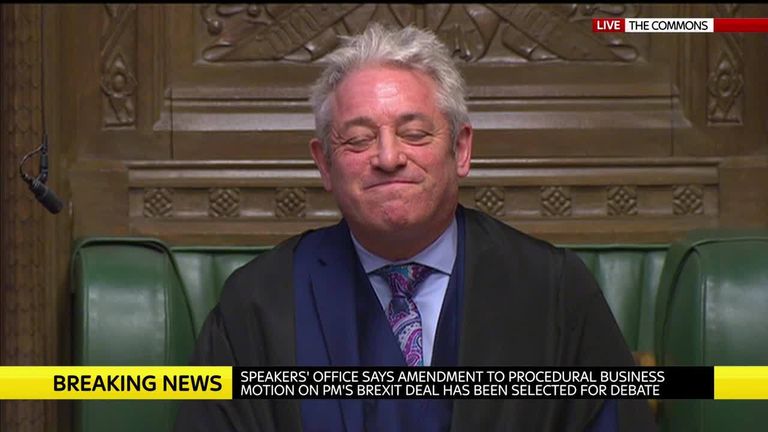Bercow's controversial move allows Commons to take back control on Brexit
Two damaging Commons defeats confirm the dire reality facing the prime minister as she struggles to deliver her version of Brexit.
Wednesday 9 January 2019 23:44, UK
Once John Bercow had made his controversial decision to allow a vote on a move to force Theresa May to reveal her Brexit Plan B if she loses the big vote next Tuesday, the result was never in doubt.
The previous evening, the government had been defeated by 303 votes to 297 on an amendment to the Finance Bill proposed by Labour's Yvetter Cooper aimed at forcing Theresa May to rule out a "no-deal" Brexit.
And after that defeat, when 20 Conservative MPs - including seven former cabinet ministers - voted against the government, a similar outcome in the vote on Dominic Grieve's Plan B amendment was inevitable.
This time the vote was 308 to 297, a majority of 11. Early estimates put the size of the Tory rebellion at 18 or so this time. But it looks like the Labour vote was up on the first vote.
The latest vote was on a seemingly innocuous move by Mr Grieve demanding a Brexit Plan B from the prime minister within three sitting days if she loses the big vote on her EU divorce deal next Tuesday.
Previously, under legislation already passed by MPs, the government had been obliged to reveal its Plan B within 21 calendar days: too long, according to Remainers, who feared a drift towards no deal on Brexit day, 29 March.
These two damaging Commons defeats, coming inside 24 hours, confirm the dire reality facing the prime minister as she struggles to deliver her version of Brexit, the deal which MPs look certain to reject on Tuesday.
Having lost control of her cabinet after the vote of no confidence in her leadership in December, she has now - thanks to the Brexit mutiny by the Democratic Unionists - disastrously lost control of the House of Commons.
The Leave campaign talked about "taking back control" during the 2016 referendum campaign. Well, the House of Commons has certainly done that now.
The problem for the prime minister, however, is that it is not Brussels that has lost control. Messrs Juncker, Tusk and Barnier haven't relinquished any control over the Brexit negotiations.
It is Mrs May and her No 10 operation that are floundering, staggering from one crisis to another and facing a constant battle to survive, as the Brexit nightmare overwhelms her government daily.
Inside the cabinet, Mrs May is at the mercy of Brexiteers like Andrea Leadsom, Liam Fox, Michael Gove and Penny Mordaunt as well as coming under pressure from born-again Brexiteers like Jeremy Hunt and Sajid Javid.
And because she is so weak and has been forced to concede she won't lead her party into the next election, there's a beauty parade for the Tory leadership under way already, with Mr Javid - "the Saj" - and Mr Hunt strutting their stuff in the past fortnight. Not very successfully, however.
Cabinet discipline has totally broken down, with every meeting leaking like a sieve, culminating in the extraordinary accounts of this week's meeting, when Mr Gove likened the PM's opponents to "50-year-olds at the end of the disco who have turned down all other offers and are waiting for Scarlett Johansson".
In the Commons, the prime minister's problems have multiplied this week as guerrilla warfare by her opponents has intensified.
She is no longer just under threat from the hard Brexiteers of Jacob Rees-Mogg's European Research Group and the stroppy and dangerously unreliable DUP.
Now the Tory Remainers, appalled by the prospect of a no-deal Brexit, have not only found the courage to vote against the government and inflict real damage, but also successfully concealed the size of their rebellion.
In the first rebellion, on the Cooper amendment to the Finance Bill, all the usual suspects were there: Mr Grieve, along with Heidi Allen, Ken Clarke, Phillip Lee, Nicky Morgan, Anna Soubry, Sarah Wollaston and co.
But who would have predicted a trio of Tory knights, Sir Michael Fallon, Sir Nicholas Soames and Sir Oliver Letwin, joining the rebellion? Mr Soames, Churchill's grandson, normally takes a dim view of disloyalty.
The majority for the Cooper amendment would have been bigger, too, if Labour eurosceptics Kate Hoey, Ronnie Campbell and Graham Stringer hadn't voted with the government and MPs from Leave constituencies in northern England, including Caroline Flint, John Mann and Lisa Nandy.
But for these half dozen or so Labour MPs, the scale of the government defeat would have been bigger.
But then again, if Tory Remainer Stephen Hammond had not been recalled to the government last month he would probably have been among the rebels too.
So what will the prime minister's Plan B be? Extending Article 50? Ken Clarke urged that again during PMQs.
A second referendum? She's dead against that - and so is Jeremy Corbyn, despite the policy passed at Labour's conference.
A general election? That's probably out of her hands. Labour says it will move a vote of no confidence if the government loses Tuesday's vote.
But there's no guarantee it would succeed, as the DUP would probably come back on board.
Which brings us back to no deal. But these two government defeats in the Commons make that option harder for the PM.
Helped enormously by Mr Bercow's controversial ruling, the Commons has indeed "taken back control".









